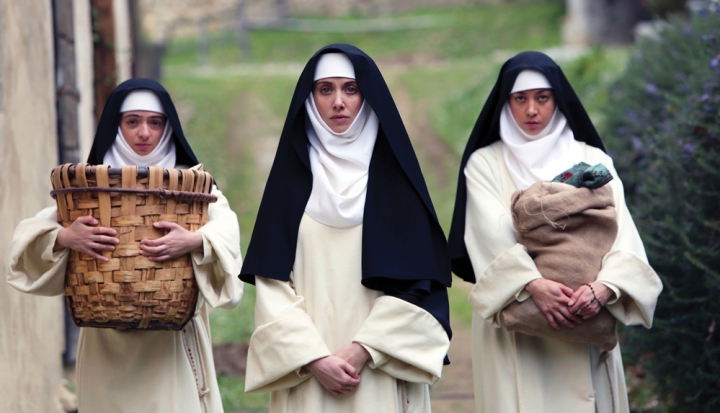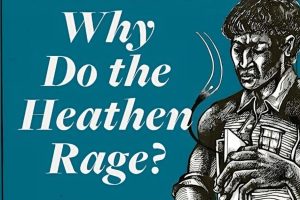Even the Old Testament writers—not generally thought of as a funny lot—knew the healing power of humor:
“A cheerful heart is a good medicine,” says the book of Proverbs (17:22).
Research backs them up. Laughing triggers natural pain relief and mood boosters. But can raunchy, tasteless humor ever be considered healthy? I confess: During a dark night of the soul I spent an entire evening binge-watching Amy Schumer clips on YouTube—and felt much better for it. Laughing at subjects and scenarios we aren’t even supposed to talk about can be another way of bringing our darkness into the light. What we find funny—and where I personally draw the line between comedy and offense—can also reveal what we fear, what we secretly hate, and what we hold sacred.
I wondered about all this as I watched The Little Hours, the recent comedy starring Aubrey Plaza and Alison Brie as cloistered nuns who swear, fornicate, and dabble in witchcraft. In the age of Amy Schumer, women swearing and fornicating is not all that shocking. But it’s amazing how quickly these old tropes become controversial again when that very same woman is wearing a habit. The Catholic League denounced the film as “pure trash,” which the filmmakers gleefully included in the trailer.
I found it heartening that in our “post-Christian” culture, secular viewers might still find a Catholic nun who defies her vows scandalous, even if they find religious life incomprehensible.
Raunchy humor is nothing new, but religious life as utterly foreign—exotic, even—is. (A nun in full habit stops me in my tracks, and I attend Mass every Sunday.) The Little Hours is based on tales from Boccaccio’s Decameron, which traded tales of bawdy nuns for laughs back in the thoroughly Christian 14th century. Pier Paolo Pasolini’s film adaption of the Decameron came out 45 years ago and remains more toothsome and disturbing than The Little Hours. Compared to Pasolini’s film, The Little Hours looks like an R-rated version of those “Nuns Having Fun” gift cards and calendars.
I might have been more shocked if any of the characters had been depicted as truly called to religious life or committed to living out her vocation. In an interview, director Jeff Baena seems awestruck that 14th-century nuns are “just people in a different time period that were going through very similar things that we go through, and had just as rich an interior life as we do.” Plaza, who is in a relationship with Baena in real life, is Catholic and was educated in all-girls Catholic schools. She relishes the chance to show the full range of a nun’s humanity, bringing the dark side of sisterhood into the light to great comedic effect. But the film falls flat as cultural commentary.
Baena sees the convent as a prison and believes that most women were there against their will. “We think of nuns and priests and clergy as being these hyper-religious people who were just dedicating their lives to Christianity,” he told another interviewer. “The reality is: It was more of a social structure. Women, when they were little girls, would go into convents, basically treating them as schools, and then by the time they were of age, let’s say 14 or older, they would get married off. But oftentimes they wouldn’t. So either they were a way for the family to sort of tithe. Or the family just wanted to curry favor with the church. Or they were widows, or they were spinsters. All these different reasons why they weren’t let out of the convent.”
Don’t tell Catherine of Siena or Clare of Assisi.
Of course there were all kinds of women and girls in medieval convents—those who had no alternative and those who did. But what might be more shocking to a contemporary audience would be a comedy about nuns who are both recognizably human, flawed, bawdy, lusty, or drunk and have also found any degree of fulfillment in a relationship with an unseen God, or the living out of a vocation to cloistered life, celibacy, or all of the above.
The Little Hours is funny, but it’s definitely not a useful or accurate representation of religious life in the 14th century—despite its source material and Baena’s claims otherwise. It is, however, an interesting look at contemporary feminism through the eyes of a man. And that gaze, apparently, hasn’t evolved much over 700 years. When women are angry, intelligent, independent, powerful, and exercising their agency, they turn out to be lesbians. Or witches. Spoiler alert: Plaza’s character is both, and she ultimately brings her sisters into the woods to cavort naked around the fire, too. (But of course they aren’t really lesbians—they kidnap the gardener and bring him back to the convent as their boy toy in the end.) What began so promisingly as a cathartic, if raunchy, release valve for the angst so many women are feeling in our current political climate, The Little Hours devolves into the same old tired fantasy.
“We’re back into a space where we’re having these very complicated, fraught, and painful arguments around sexuality and spirituality and economic equity for women,” notes Rebecca Sullivan, author of Visual Habits: Nuns, Feminism, and American Postwar Popular Culture (University of Toronto Press), in an article in The Cut. She continues, “If we’re existing in a world where a woman is equally likely to be attacked on the street for wearing a hijab or a miniskirt … we are once again deeply confused about a very simple fundamental right of women’s existence.”
The Little Hours is an exercise in that deep confusion about what makes women powerful and prevents them from exercising power. It may be a comedy, but I left the theater deeply depressed.
This article also appears in the October 2017 issue of U.S. Catholic (Vol. 82, No. 10, pages 38–39).
Image: courtesy of Sundance Institute














Add comment